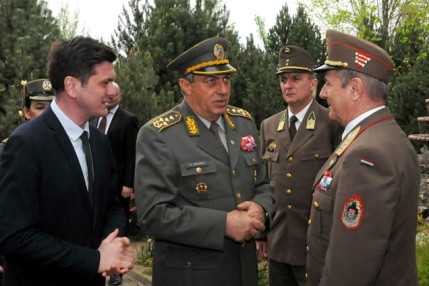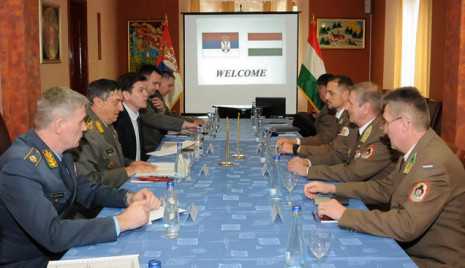Chief of Defence Holds Discussions in Serbia
Szöveg: General Staff | 2017. április 6. 13:20On Wednesday, April 5 the traditional border meeting between the Hungarian and Serbian chiefs of defence took place in Hajdukovo, Serbia. Chief of Defence Gen. Dr. Tibor Benkő was received by his Serbian counterpart, Gen. Ljubisa Dikovic, Chief of the General Staff of the Serbian armed forces.

The participants of the discussions emphasized that the ongoing military cooperation between the two countries can be called outstanding, even by historical standards. The Hungarian–Serbian military and military diplomatic relations are balanced and characterized by real cooperation. The armed forces of the two countries regularly participate in combined exercises (IRON CAT, NEIGHBOURS, PURPLE FIELD, LOAD DIFFUSER) and training events. Furthermore, the special foreign language courses running at the National University of Public Service Faculty of Military Science and Officer Training are open to Serbian soldiers. Besides, there are regular meetings held at ministerial and chiefs of defence levels.
Beyond strengthening military-to-military relations, the main goal of the meeting was to exchange experience gained in managing the migration crisis situation. Among the countries of the region, Hungary was the first to react to the increasingly unbearable pressure of illegal migration, and the Hungarian Defence Forces have been making strenuous efforts since the autumn of 2015 to keep this entirely new type of challenge under control. In 2016, shortly after Hungary’s taking measures, Serbia also started to manage the migration crisis in an efficient way. Thanks to this, the exchange of experiences between the two countries’ armed forces is a great help to keeping the Western Balkan migration route under control, and, overall, a contribution to the security of the whole region.

The topics of discussion also included the role of the Hungarian Defence Forces in the Balkans and the Hungarian–Serbian co-deployment with the United Nations Peacekeeping Force in Cyprus (UNFICYP). Serving with this foreign mission under Hungarian command for seven years now, the Serbian troops have been doing an excellent job to contribute to creating stability in the island country.
During the discussions, the two chiefs of defence expressed the same opinion that the already exemplary military-to-military relations must be further strengthened, with special regard to the sustainment of traditional relations, the continuation of combined training for subunits in the branches of service, and participation in international exercises.
Photo: General Staff